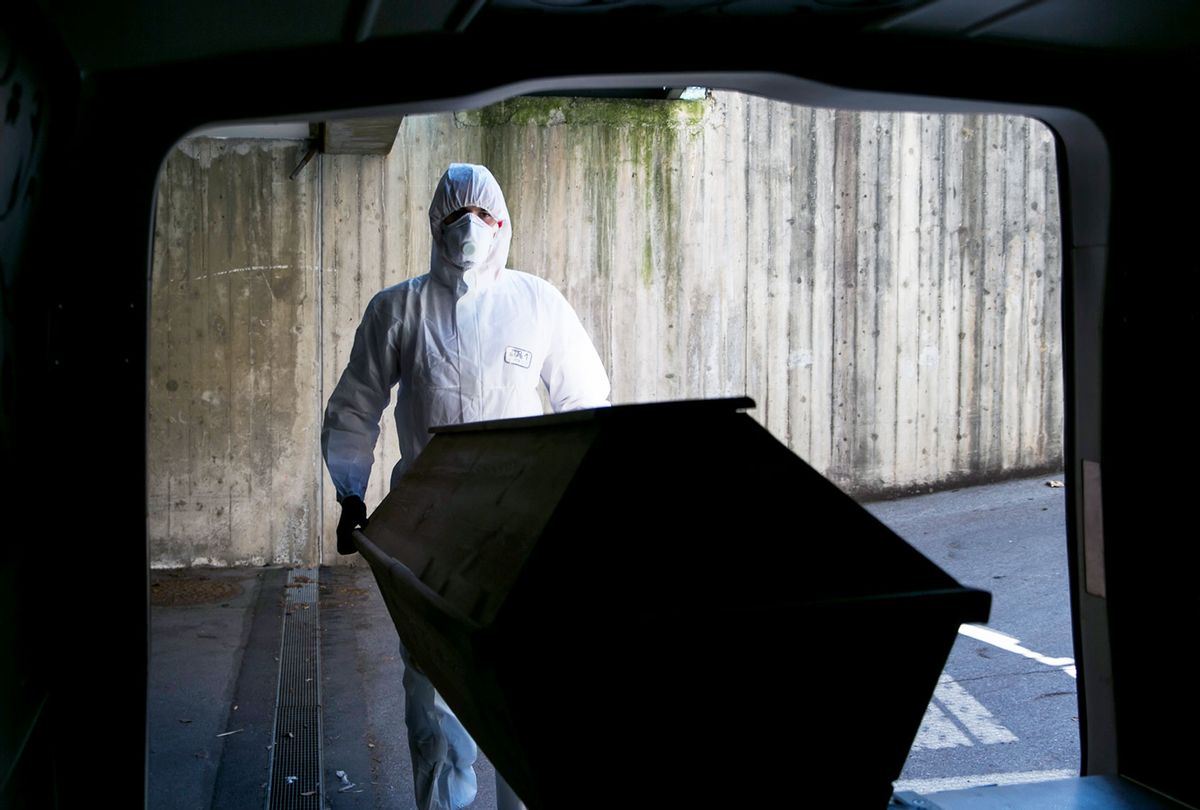The number of deaths from COVID-19 has drastically declined since the beginning of the year.
In January 2021, the country's deadliest month of the pandemic, the U.S. hit a grim record of nearly 4,000 people dying from complications of COVID-19 in one day. For the week ending June 28, 2021, only 168 new deaths were reported, according to the Centers for Disease Control and Prevention (CDC). While this is a promising trajectory that tangibly shows the success of the country's mass vaccination program, Americans are still dying every day. Most of those deaths are of those who are not yet vaccinated, generally due to either lack of accessibility to the vaccine or anti-vaccine attitudes.
"In my experience treating COVID patients, the ones I'm seeing now are all exclusively unvaccinated individuals," said Dr. Amesh Adalja, a senior scholar at the Johns Hopkins Center, in a phone interview. "Most of which have some high-risk condition, they were obese or they're elderly people who just have refrained from getting vaccinated, that's exclusively what I've been taking care of for at least probably the last two months or so."
Adalja, who works in an intensive care unit in Pennsylvania, recently had a 45-year-old patient who weighed 500 pounds die from COVID-19 complications.
"More people need to be vaccinated, there's still not enough," Adalja said. "There are still major gaps in vaccine coverage that's causing some people to get infected, and some people to require hospitalization, and a couple hundred people to die every day."
The CDC reports that 66.2 percent of American adults have received at least one dose of a vaccine. Among all age groups, that equates to a mere 46.4 percent of the total American population being fully vaccinated. States that continue to have higher rates of COVID-19 deaths and hospitalizations include Ohio, Missouri, Arizona, Wyoming, Montana, and Washington. In Missouri, local news outlets report that surges in the southwest region of the state are overwhelming hospitals once again who are having to turn away patients. Local health officials are urging people to get vaccinated as these outbreaks are happening among largely unvaccinated communities.
Want more health and science stories in your inbox? Subscribe to Salon's weekly newsletter The Vulgar Scientist.
"The virus doesn't respect the boundaries of political subdivisions like counties, states or regions, and with the greater chance of transmission with the Delta variant, hot spots will be inundated with patients," Dave Dillon, a spokesperson for the Missouri Hospital Association, told the Springfield News-Leader. "It is fair to say that hospitals are already stretched to address pent-up demand for health services that were curtailed last year, and into spring."
According to a CNN analysis that probed deeper into demographics of COVID-19 deaths over the last couple months, many are younger and more are disproportionately Black Americans.
"These lower rates may be due in part, to vaccine hesitancy, but they may also be due to inequities in vaccine access," Dr. Lisa Cooper, founder of the Johns Hopkins Center for Health Equity, told CNN. "Many African Americans in the South live in rural areas with limited access to health care facilities. Furthermore, many people may have other stressors related to housing, food, or job insecurity, which may be preventing them from getting vaccinated."
Dr. Monica Gandhi, an infectious disease doctor and professor of medicine at the University of California–San Francisco, attributes vaccine hesitancy to a few different factors.
"There's a lot of misinformation, and there are reports that are circulating that say how many people have died after a vaccination, they look credible and calm," Gandhi said. "The problem with [Vaccine Adverse Event Reporting System] is it's completely voluntary, doctors, patients, anyone can report anything — so if data is reported people can essentially report that a death is happening, and say that it was around the time someone got a vaccine."
Gandhi added that misinformation being spread by people who appear credible is harming public trust in the vaccine, too. Then, there are young people who might not be motivated to get the vaccine, or perhaps they believe the myth that they can die from it.
And then there are the reports that people who have had breakthrough cases, meaning they're fully vaccinated but get COVID-19, are still dying. The CDC states that the total number of individuals who died after getting COVID-19 despite vaccination is 750 — a very small number out of the 153,776,118 Americans who have been fully vaccinated.
The rigors of work may affect vaccination rates, too, Gandhi said.
"Anytime that you're on an hourly wage and your employer doesn't give you time off to go get the vaccine, nor does he give you time off the next day if you don't feel well, then you're not going to take time out to lose your hourly wage," Gandhi said. " I think that's still happening in terms of access."
The consequences of vaccine inaccessibility are being observed now, as deaths generally occur between two to 8 weeks after a person first has symptoms of COVID-19.
As Salon previously reported, many municipalities have been relying on smaller, more localized efforts — like mobile vaccination clinics — to reach rural, lower socioeconomic, and marginalized communities and close the vaccination gap. But that doesn't seem to work in fighting misinformation and convincing die-hard anti-vaxxers.
Doctors fear that misinformation about the vaccine is costing people their lives, and misinformation will continue to do so as the coronavirus spreads in unvaccinated populations.
"A lot of the people have kind of swallowed some of the myths about the vaccine," Adalja said. "And that may be what is the major aspect holding up vaccination."
*This story was updated on June 30 at 2:24 pm EST to add one detail about the 45-year-old who died



Shares